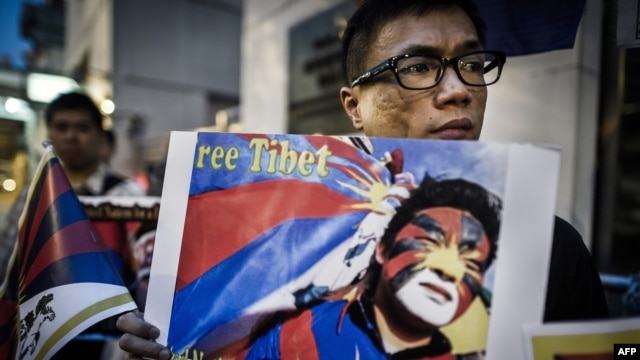Tibet Unrest Unlikely to Fade, Activists Say
|
|
Date: 8/16/2012 8:03:07 AM
Sender: VOA
|

[size=2Rights group activists stage a protest to raise awareness on the human rights situation in Tibet and the closure of the territory to foreign visitors, outside the Chinese liaison office in Hong Kong, June 20, 2012.][/size]
Rights groups and other observers say unrest continues in Tibetan areas of China, a sign, they say, that protests against Chinese rule are not fading.
Human rights groups reported this week that several hundred Tibetans marched in protests on Tuesday, after learning of police brutality against a group of young Tibetans the previous day. The demonstration was in the Western province of Qinghai, in a town called Rongwo.
Activist organization Free Tibet says the protest was sparked by police beatings of at least two men, whose car had been stopped and the men detained in the early hours of Tuesday morning.
“The community became outraged that there was yet another instance of police brutality, and lack of process for Tibetans and took to the streets protesting,” says Stephanie Bridgen, Free Tibet’s director.
Self-immolations
Tuesday’s unrest in Rongwo happened less than 24 hours after two self-immolations occurred in Sichuan’s Ngaba Town, home of the defiant Kirti monastery. On Monday evening, two monks set themselves ablaze in a street renamed "Martyr Street" by Free Tibet contacts, because of the many immolations that have occurred there in the past year.
Free Tibet says the protests began after bystanders saw Chinese state security personnel beating one of the two monks, after extinguishing the flames that engulfed him. Eyewitnesses told Free Tibet that security personnel used metal batons spiked with nails to antagonize the protesters, and that they killed one demonstrator.
The Chinese government had no official reaction on Thursday to allegations of police brutality both in Qinghai’s Rongwo town, and in Sichuan’s Ngaba town.
Tibetan areas of China are off limit for journalists, making it impossible to independently verify many accounts of protests, self-immolations and violence.
Since the first self-immolation in 2009, more than 40 Tibetans have committed suicide in China. More than half of them took place in Ngaba town, Aba in Chinese, a Tibetan area of Sichuan province, home to Kirti monastery.
"Tibetan Spring"
Bridgen compares what is happening in Tibet to the so-called "Arab Spring" upheaval that started in the Middle East last year, calling it the “Tibetan spring.”
“We started feeling that actually this was not just a few acts of protest, that this was becoming a coordinated action,” says Stephanie Bridgen, head of the human rights group. “Although we have not been able to document the fact that there is any actual joint planning. But what we do know, is that people have been inspired from one action into the other.”
China has traditionally responded to unrest in Tibet by stepping up security and prohibiting independent reports from the region. The country’s foreign ministry blames groups outside China, including the Tibetan spiritual leader the Dalai Lama and the Tibetan exile government for the more recent unrest.
Beijing does not recognize the Tibetan government in exile, based in the Indian region of Dharamsala, but has been holding talks with Dalai Lama representatives in the past years. Last June, two senior envoys of the Tibetan spiritual leader have resigned from their posts, blaming what they called the “deteriorating situation inside Tibet,” which they said left little room for substantial progress at the talks.
Mutual mistrust
Robert Barnett, professor of Tibetan history at New York’s Columbia University, says there is deep mutual mistrust between the two sides about the other’s intentions.
“It has this very deep historical mindset that they [exiled Tibetans] are trying to trick China, and they are secretly going to push for independence,” Barnett said.
Despite the lack of progress at the talks, Barnett says there are signs of differing views within the Chinese leadership as to how to handle the Tibetan issue, including relaxing the repressive security policies in the region.
As China prepares to replace senior leaders later this year at the 18th national party congress, Barnett sees the hope of a more lenient approach to addressing discontent in the region.
“It can't be ruled out that under Xi Jinping, if he becomes the next ruler, there might be some kind of progress, probably the progress would not be very radical, would not be very striking from an outsider's point of view but it still might present some kind of movement forward,” he says.
Last month, to mark Lobsang Sangay’s first year in office as prime minister of the Tibetan government in exile, hundreds of monks and nuns gathered in Dharmsala.
During the celebrations, Sangay said that Tibetans would continue to press for freedom of their homeland, even if their struggle were to take another 50 years.
But he also called for the resumption of talks with Chinese authorities, adding that a Task Force on negotiation will meet with the new Chinese leadership in December, after China’s switch of power seats. |
|
| |
